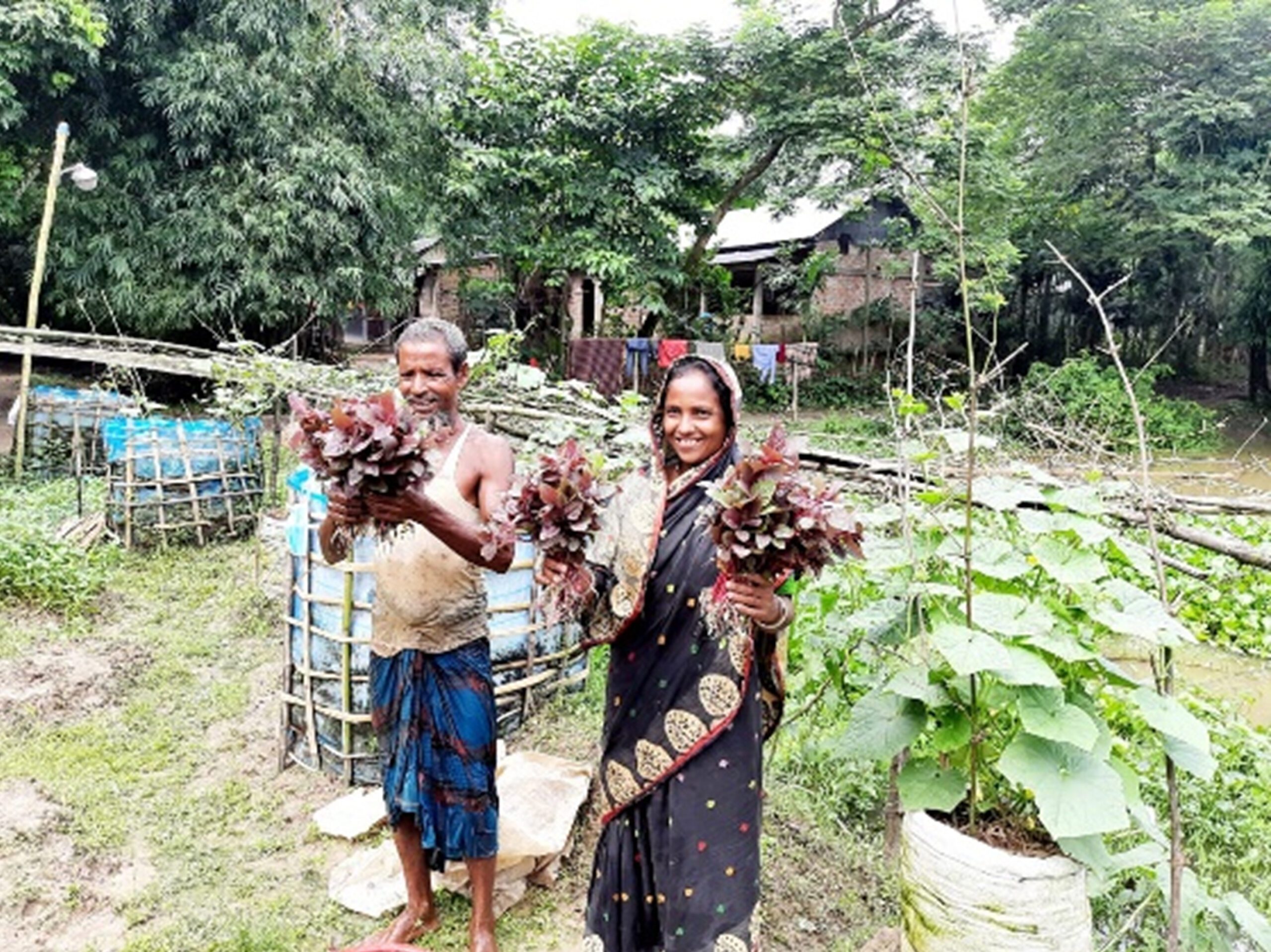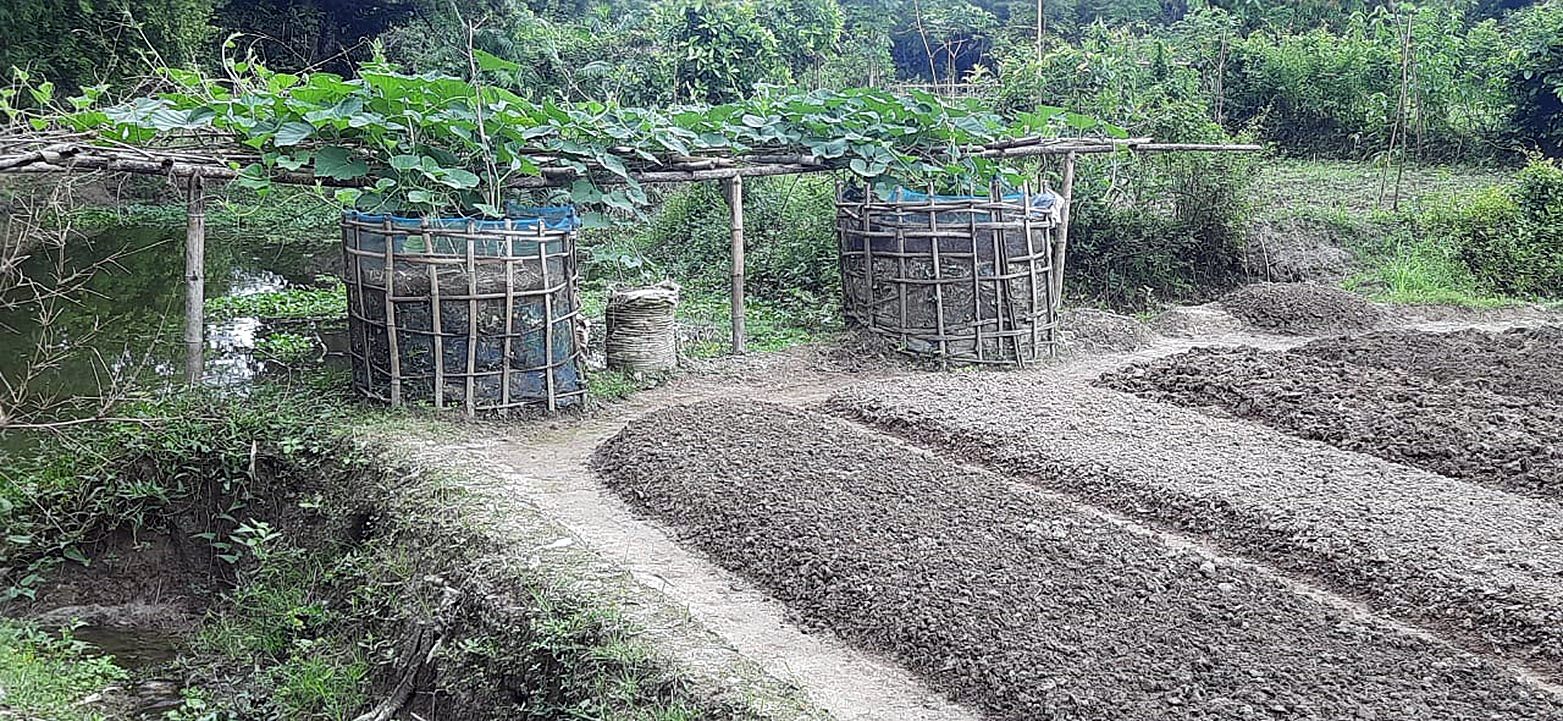Building resilience against climate disasters in Bangladesh
Hosne Begum was living in extreme poverty as her husband struggled to support their family of five in remote Bangladesh. Her husband, who was working as a day laborer, was the sole earning member of the five-member family, but his income varied greatly between seasons, creating instability for the family. Because of this, they were desperately seeking a new solution to make ends meet.
Seeds spark a new beginning with homestead gardening

When Hosne learned about Helen Keller’s horticulture and poultry training, she quickly enrolled to learn how she could ensure a nutritious diet for her family. With vegetable seeds in hand, Hosne began homestead gardening and rearing her own poultry. She soon emerged as one of the leaders in the training group, cultivating enough food to feed her family with eggs and vegetables.
Not only did her garden improve the nutrition of her family, but Hosne also was able to sell surplus vegetables and eggs at the local market, earning a substantial income. Hosne flourished in poultry rearing too. Over time, she bred more than 15 chickens, keeping them healthy by following best practices shared by the Helen Keller team, including regular vaccinations for her chickens. As a result, her family’s egg and protein consumption increased dramatically, offering better nutrition for her children and ensuring ongoing food security.
Disaster-resilient farming practices helps crops grow during monsoon season
Hosne’s successful garden is all the more impressive considering that Bangladesh is highly susceptible to flooding and heavy rainfall. With training from Helen Keller, she has been using disaster resilient farming practices, which allows her to grow vegetables during monsoon season.
…Now, with multiple climate resilient structures in my garden, including raised beds, raised pits, and tower gardens, I am well prepared in the face of any disaster.
Hosne Begum
“Before, I was not familiar with resilient farming methods, and consequently, I could not save my plants from floods and heavy rainfall,” she said. “But now with multiple climate resilient structures in my garden, including raised beds, raised pits, and tower gardens, I am well prepared in the face of any disaster.”

These methods are particularly important as Bangladesh faces increased impacts from climate change and frequent flooding. According to the World Bank, about 3.5 million of Bangladesh’s 160 million people are at risk of river flooding every year – and as global temperatures increase, flooding is estimated to rise by 24%. Bangladesh is also one of the world’s most climate-vulnerable countries, where the poor are disproportionately impacted as frequent floods threaten livelihoods, agriculture, infrastructure and clean water supply.
While more resilient agricultural methods can’t provide relief from all these effects, they can provide more stability for residents like Hosne Begum. Before, her family lived meal to meal, but with Helen Keller’s help she now has stability and a substantial buffer. Her crops thrive, allowing her to sell surplus harvest, even during the wet winter season.
A successful farmer becomes a local community leader

Noticing her skills and dedication, Helen Keller selected Hosne to become a village model farmer, providing her with additional resources. She now trains people in her community, who visit her garden to learn about disaster resilient farming techniques and how they can replicate them. Hosne Begum provides technical expertise, guidance, and motivation to her peers, who then cultivate their own nutritious foods – keeping them fed and supported no matter the weather.
In winter, she provides seedlings of vegetables to her group members so they can take them back to their own gardens. She received new fruit seedlings and cash support for fruit cultivation, and Helen Keller has also continued to provide training on additional methods, like sustainable composting, that allows her thriving business to grow.
[Helen Keller] has helped me transform my homestead garden into a high yielding agricultural plot with greater resilience against disasters.
Hosne Begum
“[Helen Keller] has helped me transform my homestead garden into a high yielding agricultural plot with greater resilience against disasters,” she said.
Putting climate resilient techniques into action have helped Hosne to protect her harvest against seasonal calamities – and now others are following her example. Hosne is now planning to expand her business, ensuring the long-term food and nutrition security of her family.

Women’s livelihoods are susceptible to the effects of climate change. Training and support helps feed their families.









